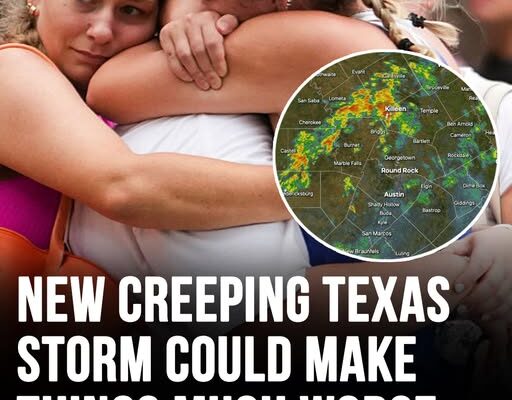Central Texas is once again on high alert this Monday as relentless, slow-moving storms sweep through the region, compounding the devastation from last weekend’s catastrophic flooding.
The National Weather Service has issued urgent flash flood warnings and expanded a regional flood watch—now affecting nearly 5 million residents—as saturated ground and overflowing rivers leave little room for more water.
What began as a joyful Fourth of July getaway turned into a nightmare of destruction, with entire communities submerged, families torn apart, and a rising death toll that continues to shake the heart of Texas.
Among the most heartbreaking tragedies was the loss at Camp Mystic, a cherished all-girls summer retreat nestled on the banks of the Guadalupe River, where rising waters turned a place of laughter and friendship into a scene of chaos and grief.

In a terrifying surge, the Guadalupe River swelled more than 20 feet in less than two hours early on the morning of July 4, blindsiding families as they slept. The floodwaters tore through Camp Mystic, turning a beloved summer tradition into tragedy. The camp has now confirmed the heartbreaking loss of 27 campers and counselors.
Across Central Texas, the death toll from the unprecedented flooding has climbed to at least 82, with dozens still missing. Kerr County, home to Camp Mystic, has suffered the deepest scars—local officials confirm 68 lives lost there alone, including 28 children.
As the search for survivors enters another day, the sense of urgency is palpable. Rescue teams are battling exhaustion, dangerous currents, and unrelenting weather in hopes of finding the 41 people still unaccounted for. But time is running out—and so is hope.
New Storms Loom Over Flood-Weary Towns
Adding to the peril, a flood watch remains in effect for nearly 5 million Texans as more storms loom. Governor Greg Abbott issued a somber warning Sunday, urging residents to stay vigilant: “Flash flooding continues to pose a threat, and more heavy rainfall is on the way.”
The National Weather Service (NWS) echoed the alarm, forecasting an additional 2 to 4 inches of rain across already saturated ground—with some areas possibly receiving up to 10 inches today alone. Meteorologists say slow-moving storms like these are especially dangerous, dumping enormous amounts of rain in concentrated areas and rapidly overwhelming rivers, roads, and rescue operations.
“This is a disaster zone,” one emergency responder said grimly.
As of Monday morning, the most severe weather is hammering the Killeen area, where flash flood warnings remain in place. The NWS in Austin confirmed that the flood watch will stay active through 8 p.m. ET (7 p.m. CDT).
A Race Against Time and Nature
Search teams on the ground, in the air, and on water are navigating what one volunteer described as a “minefield.” Members of the United Cajun Navy, a Louisiana-based disaster response group, are working side-by-side with local crews in Kerrville. But the fast-moving, debris-choked waters make every mission a risk.
“When these waters are rushing… they continue to rise and fall,” volunteer Nick Sortor told CNN. “They expose new debris, bring more into the current — it’s dangerous for us, for our boats, for everyone involved.”
Footage from the field shows the grueling reality: rescuers repeatedly hauling their boats out of the water to maneuver around submerged hazards — every second lost to an obstacle could cost a life.

“You’re seeing it in the footage right now — rescuers having to pull their boat out of the water, then put it back in, over and over again,” said volunteer Nick Sortor. “There are just so many obstacles.”
Progress is painfully slow. In some areas, rescue crews are spending hours just to move a few dozen feet.
“They’re chainsawing through debris just to get 50 feet down the river,” Sortor explained, describing scenes where fallen trees and shifting wreckage clog the waterways. “You have to constantly worry about snapped limbs crashing down on top of rescuers. We’ve already had a couple close calls.”
Despite the danger, teams press forward — driven by the hope that someone, somewhere, might still be waiting to be saved.
